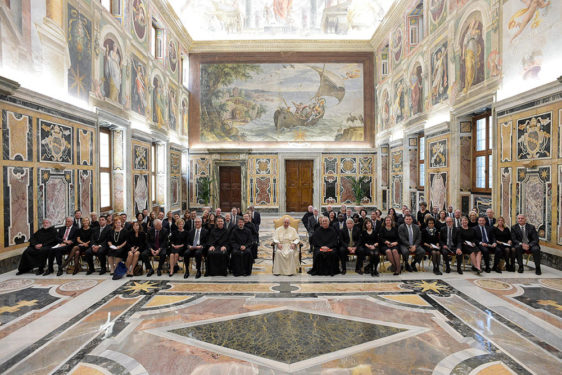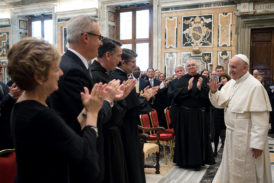
By Christopher White, The Tablet’s National Correspondent
VILLANOVA, Pennsylvania —While Villanova University may still be reeling from winning a national title in basketball earlier this month, organizers of a major conference timed to coincide with the five-year anniversary of Pope Francis’ papacy say their efforts show that more importantly than athletics, “Right now we are the national champions of Pope Francis.”
“Francis, a Voice Crying Out in the World: Mercy, Justice, Love, & Care for the Earth,” which took place April 12-15, was sponsored by the university’s Institute for Catholic Social Thought and brought together some of the pope’s closest confidants, advisors and advocates from around the world.
Coincidentally, during the same time the conference was taking place, members of Villanova’s Board of Trustees met with the pope in Rome.
But as one participant in the conference, Gerald Beyer, an associate professor of theology and religious studies at Villanova, said, having a list of headliners on campus – including Jesuit priest and editor of La Civiltà Cattolica, Father Antonio Spadaro, Cardinal Joseph Tobin of Newark, N.J., and Cardinal Óscar Rodríguez Maradiaga of Honduras, a member of the Holy Father’s advisory council of cardinals – produced a climate in which “this conference felt like Francis has been brought directly to us through these individuals.”
In the opening keynote address, Cardinal Tobin cited Pope Francis’ address to the College of Cardinals before his election as pope where he called for a Church that focused its energies on the peripheries and rejected a desire to be self-referential.

Cardinal Tobin rejected the “insistent calls … for Christians to accept that this nation and most of the world is hostile to the Gospel,” and come to terms with the idea that “true disciples” are fewer in number.
He denounced calls for a “smaller, purer Church,” saying that “it is only the Lord” who judges who belongs and who does not belong in the Church, adding that this is not merely the vision of Pope Francis, but Popes John Paul II and Benedict XVI, as well.
Addressing recent controversies over Pope Francis’ cautious opening of Communion for divorced and remarried Catholics, the cardinal reminded those present that it was St. Pope John Paul II who first raised the question of how to provide pastoral care for divorced and remarried Catholics in his 1981 apostolic exhortation, “Familiaris Consortio.” While Pope Francis has taken the issue further, the cardinal noted that both popes are “united in their care for the wounded members of the Church.”
Assessing his papacy at the five-year mark, Cardinal Tobin said the pontiff “has made the Church visible among those most abandoned, most forgotten, and most in need.”
While he noted there are certain areas of the Church’s sexual ethics that cannot change, the cardinal said that by elevating other matters, such as ecological concerns, the pope demonstrates that “there are other areas in which the Church and world can work together.”
Purer When Driven by Mercy
He concluded by arguing that should the Church embrace the Holy Father’s vision of a Church driven by mercy to those on the margins, it could – and would – become purer in the process.
Those sentiments were echoed later in the conference by Father Spadaro, who said, “The Church lives a continuous faith because it is on a journey with men and women.” He went on to argue that at the root of this pontificate is a belief that God is active in the world, hence Pope Francis’ strong emphasis on discernment in order to best understand how to respond to God’s will.
“Francis sees fluidity between the public square and the Church,” Father Spadaro noted, “to let people enter the Church, yes, but also to let Christ go out.”
Weighing in on the topic of Vatican reform, he said that “humility prevents Francis from envisioning himself as a Don Quixote of reform,” a reference to the Spanish fictional character who aims at noble goals, despite becoming unhinged in the process.
The priest emphasized that the reformer of the Church is not pope Francis, but it is “Christ who will bring about reforms.”
Placing Pope Francis’ papacy in the context of Vatican II was a consistent theme throughout the weekend, with one of the foremost historians of the council, Jesuit Father John O’Malley, and Massimo Faggioli, one of today’s most prolific scholars on the council, bookending the conference with speeches on Pope Francis’ interpretation of the Second Vatican Council.
For both men, Pope Francis has served as a bridge between pastoral and doctrinal theology, and his papacy has ushered in a new phase of the reception of the council.
According to Faggioli, the election of Pope Francis served as a repudiation of the view that Vatican II was an anomaly in Church history, and the pontiff’s energies have been focused not on waging battles on the proper interpretation of the council, but on implementing it.
Father O’Malley noted that holiness became a pervasive theme of the council, and the pope’s latest exhortation, “Gaudete et Exsultate,” is further evidence of his continuing that implementation.
For Faggioli, the emphasis on the “acts and gestures” in the Pope Francis papacy, serve as a means of giving life to the pastoral focus of the council, motivated by the Church’s doctrine.
Father O’Malley echoed those sentiments, asking: “When several years ago, Francis brought back with him to the Vatican 12 Muslim refugees, was he only being pastoral? Was he doing nothing more than performing a compassionate act in the hopes that others, especially governments, would be inspired to go and do likewise? Or was he not proclaiming, by indeed, something more powerful than any words could possibly express, a doctrine – a spiritual and pastoral doctrine – a doctrine so central to being a Christian that St. Matthew tells us our very salvation depends upon it: ‘I was a stranger and you took me in.’”
“By these initiatives, he has been putting the Council in practice by word and deed,” said Father O’Malley.
Representing the perspective of the Global South – where the pope is trying to unleash the energy and spirituality of the Latin American Church onto the world – Cardinal Maradiaga said that Pope Francis has “written encyclicals” more from his deeds than from his words.
Jesuit Father Agbonkhianmeghe Orobator, president of the Conference of Jesuit Major Superiors of Africa and Madagascar, said behind the tensions of the Francis papacy “lies the fundamental question of the inclusion of Catholics of all various manners of life.”
He went on to cite the challenge integrating women, gay individuals, refugees, and the poor as examples of groups that this papacy has attempted to reach in new and significant ways.
“Papal imagery has never been so powerful,” said Father Orobator, and his “practice of love, justice, mercy, and care for God’s creation,” has fundamentally reshaped the way the Church is viewed in the modern world.
Jeffrey Sachs, director of the Earth Institute at Columbia University and one of the world’s leading economists, punctuated that further by noting “there is no voice more important in the world than Pope Francis in the fight for justice, peace, and decency.”
Sachs, who has advised the Vatican on papal documents from John Paul II’s Centesimus Annus in 1991 to Pope Francis’s Laudato Si’ in 2015, said that the Church has consistently led the world’s thinking on “new things” for 125 years.
Reflecting on and advancing those “new things” in the era of Pope Francis was, in many respects, the ultimate purpose of Villanova’s conference, which was the most extensive exploration to take place in the United States at the five-year mark of his papacy.
The conference brought together nearly 150 attendees from as far away as Australia and Kenya. Among those attendees, was Apostolic Nuncio Archbishop Christophe Pierre, the pope’s representative to the United States, who did not speak at the event, but could often be found in the front row of each lecture, giving what could be described as a tacit imprimatur of the event.
Hosted by Villanova’s Office of Mission and Ministry, the conference was unabashedly pro-Francis and aimed definitely to set the record straight about both the legitimacy and orthodoxy of the Francis papacy, in a country where some of his most vocal critics reside.
Yet Villanova’s Theology department will not be deterred.
“This conference has shown very clearly the depth, breadth, and beauty of his papacy,” said Beyer. “As we all know, there are critics of Pope Francis, sometimes vociferous, but we are demonstrating our appreciation for this papacy and all of the gifts he brings to the Church.”
